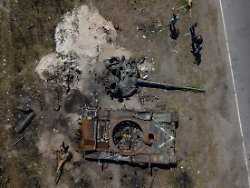Government skeptical
The new war goal is called “Victory of Ukraine”
5/7/2022, 5:46 p.m
The West wants to help Ukraine, but not everyone has the same goal in mind. Shortly after the attack, the focus was on defence, but now the United States is saying that Kyiv must win the war. There are doubts in the federal government as to whether this is realistic.
When Emmanuel Macron travels to Berlin on Monday for his first visit after his re-election as French President, he has to clarify an important question with Olaf Scholz: What is the aim of helping Ukraine? Because in the past few days the debate has shifted – raising a number of follow-up questions for military and civilian aid and the duration of sanctions. While at the beginning of the Russian invasion the main concern was that the Ukraine should hold out against the Russian attackers for a few days and then a few weeks, the war aims have now changed. “It is now primarily the narrative of the Americans that the Russians must lose and must be expelled from Ukraine,” says Stefan Meister, Russia expert at the German Council on Foreign Relations (DGAP).
The meeting of the defense ministers of several dozen supporter states in Ramstein, initiated by the USA, served above all to help Ukraine in the medium term and to provide them with weapons for the fight. In fact, US Secretary of Defense Lloyd Austin had stated a goal that goes far beyond Ukraine: “We want to see Russia weakened to the extent that it makes it impossible for the country to do what it did in Ukraine with the invasion.”
Baerbock: All Russian soldiers must leave the country
Foreign Minister Annalena Baerbock also emphasized: “With the sanctions, we are ensuring that further military action in other regions by Russian forces alone is not possible in the next few years.” The question is how long the sanctions would actually have to remain in place given Russia’s current record revenues from oil and gas sales with such a target. Regarding Ukraine itself, Baerbock said that all Russian soldiers would have to leave the country – including those on the Crimean peninsula annexed in 2014.
This does not meet with approval everywhere in the federal government. Chancellor Scholz, for example, is sticking to a much more cautious choice of words. “Putin must not win this criminal war of aggression against Ukraine – and he will not win this war either,” he said in a speech in Hamburg on Friday. Scholz differs significantly from the statements by EU Commission President Ursula von der Leyen and British Prime Minister Boris Johnson, who speak of a “victory” for Ukraine.
This fits with the new self-confidence in Kyiv and obviously rubs off on German politicians: it is no longer a question of Ukraine not losing, but of being able to win the war, say the chairman of the Foreign Affairs Committee in the Bundestag, Michael Roth from the SPD and the CDU defense politician Roderich Kiesewetter agreed. Ukrainian President Volodymyr Zelenskyy is much more cautious. “The minimum is to get our territories back to where they were on February 23,” he said in a video link at Chatham House think tank ahead of the February 24 invasion launch. That would exclude the Crimean peninsula, for example.
Unrealistic goals?
That’s why it’s usually completely unclear what is actually meant when politicians talk about “winning” – and how realistic that is. In German government circles, it is considered rather utopian that the nuclear superpower Russia could ultimately hand back Crimea, where the central base of the Russian Black Sea Navy is located. DGAP expert Meister also does not see a complete victory for Ukraine as realistic. “There won’t be an end to the war in the foreseeable future if you set your sights too high,” he warns.
Despite its successes, the Ukrainian army is a black box whose strength cannot be assessed in the West. The much larger Russia could also recruit a large number of soldiers with a partial mobilization. He warns of a protracted, low-intensity war. Military experts also emphasize that the mere reconquest of the areas occupied by the Russian invaders will require different and, above all, far more weapons from the West – and a new debate as to whether one is ready for this.
Is the Kremlin reformulating its war goals?
Civil aid, too, which, according to Poland, raised $6.5 billion at the Ukraine donor conference, ultimately depends on what you want to achieve. Because humanitarian aid and financial injections to avoid a Ukrainian state bankruptcy must be provided quickly. But classic reconstruction aid only makes sense when Russia stops shooting up Ukrainian houses or infrastructure. “And no one knows when sanctions will ever be lifted if they are linked to the withdrawal of all Russian soldiers,” the federal government says.
But the rhetoric has also changed on the Russian side. When the Russian attackers were still marching towards Kyiv, there was talk of denazification and disarmament of Ukraine. Then the Ministry of Defense pushed the conquest of the Donbass to the fore. Cutting off Ukraine from the Black Sea is also considered a possible goal – although all Western governments emphasize that they do not know what President Vladimir Putin really wants. It is possible that the Kremlin will reformulate its own goals on May 9 for the big military parade commemorating the victory in World War II – immediately before Macron and Scholz meet.
